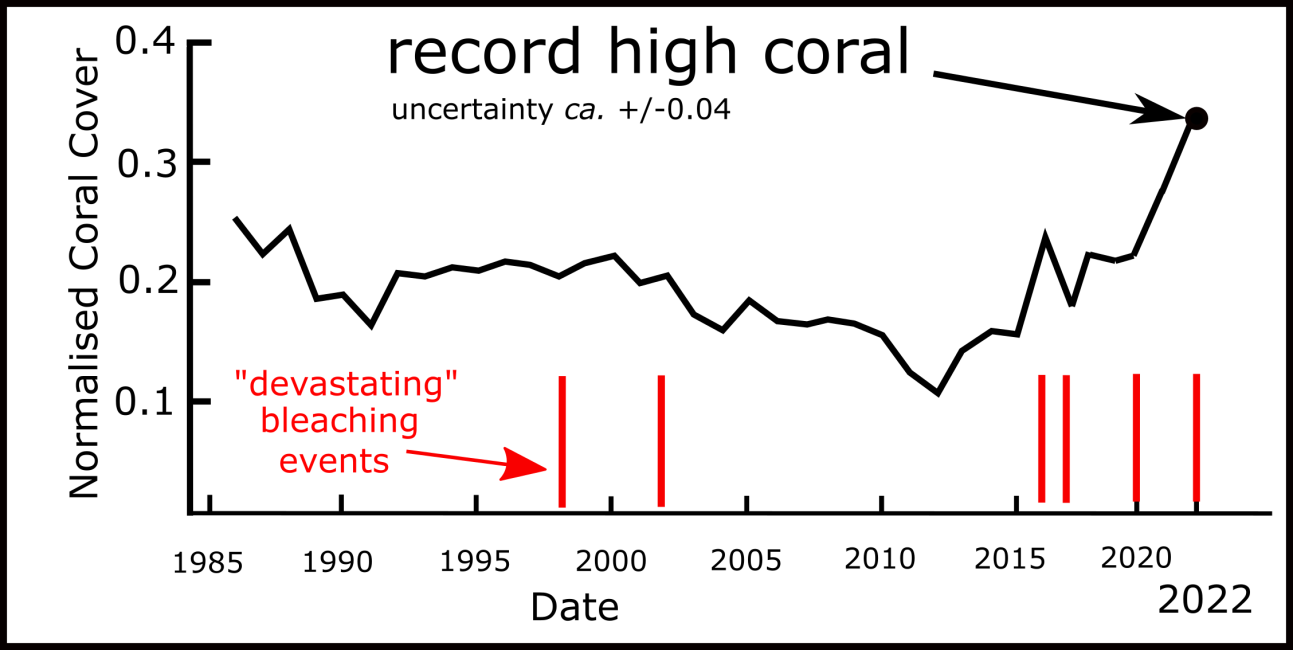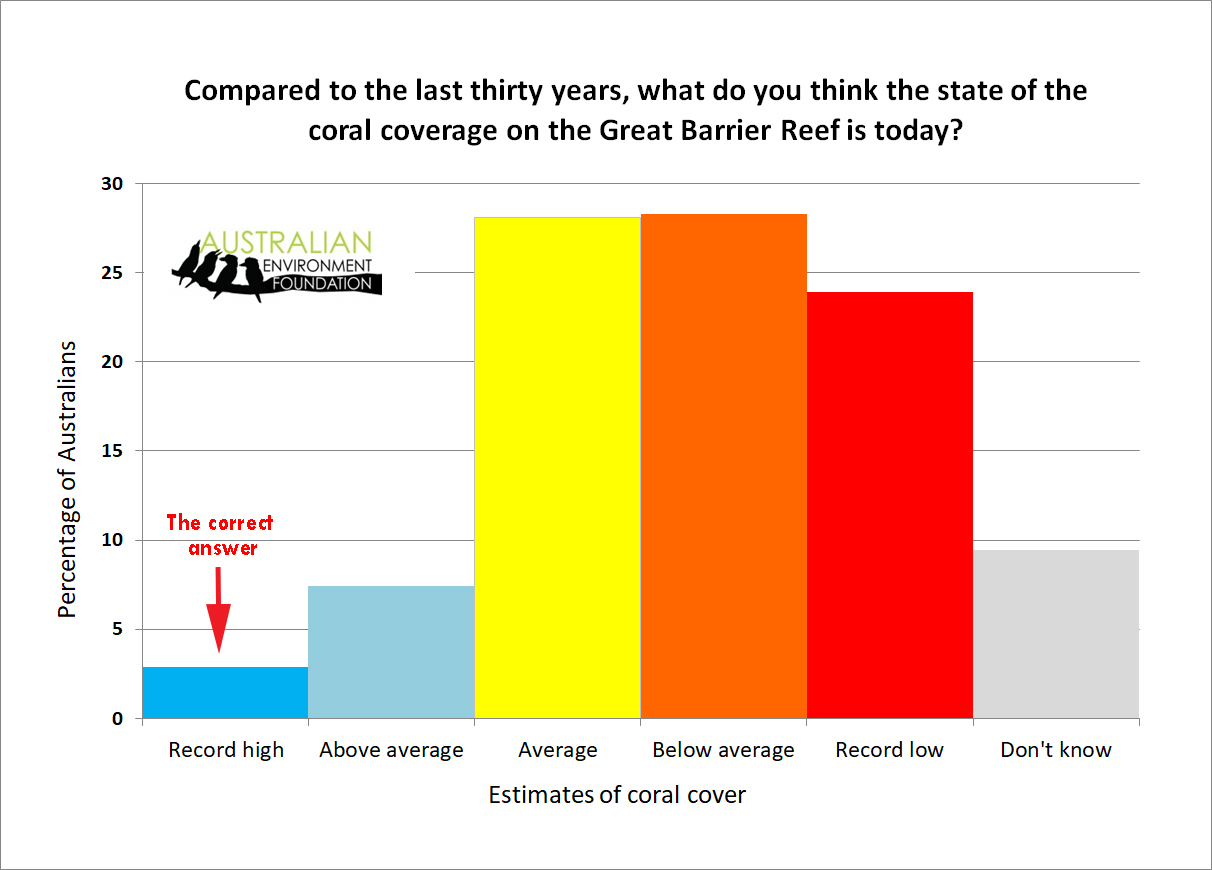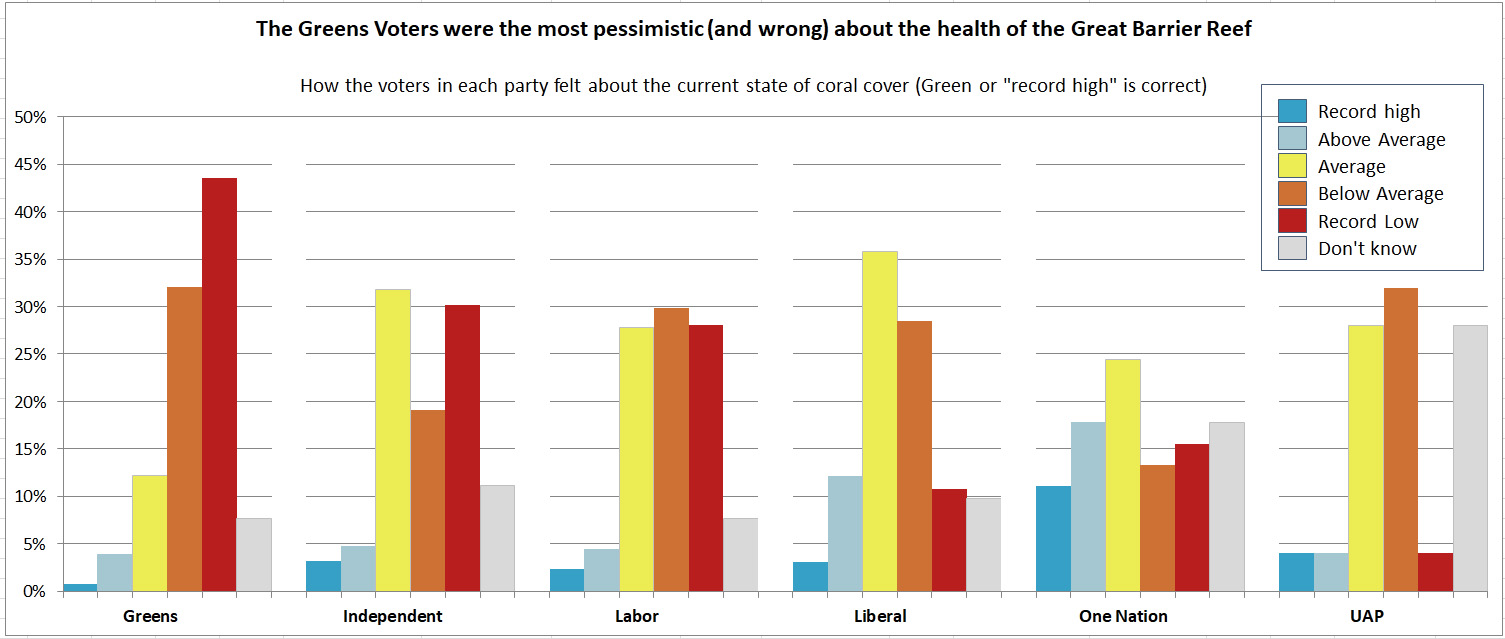Only 3% of Australians know the true state of the Reef!
 Ten years ago, coral cover on the Great Barrier Reef hit record lows. The news has been full of dire reports of bleaching ever since, but quietly, a phenomenal recovery was blossoming across the full 2,000 kilometer span of the reef. Last year coral cover hit a record high — better than any year since records began in 1986. Corals are thriving but Australians are spending half a billion dollars to save them?
Ten years ago, coral cover on the Great Barrier Reef hit record lows. The news has been full of dire reports of bleaching ever since, but quietly, a phenomenal recovery was blossoming across the full 2,000 kilometer span of the reef. Last year coral cover hit a record high — better than any year since records began in 1986. Corals are thriving but Australians are spending half a billion dollars to save them?
I’m a Director of the Australian Environment Foundation, and after this new record, I worked with fellow Director Peter Ridd to arrange surveys to find out whether Australians had heard the news. What we found was a nation mis-informed.
I am honored to issue the report below. Please forward it on, send letters to the Editors and tell the world. Consider joining the AEF to help us get more science into environmental debates.
— Jo
_________________________________________

Great Barrier Reef in record coral cover but 97% of Australians don’t know it
Australian Environment Foundation (AEF)
23 April 2023
Left in the dark, Australians are wasting money on the wrong environmental issues
“Almost nobody realises that the reef has near record high coral cover according to the last survey carried out by the Australian Institute of Marine science” (AIMS) said Tom Bostock, the Australian Environment Foundation’s (AEF) president.
In the last 36 years the Great Barrier Reef has never had more coral. AIMS have been conducting detailed underwater surveys since 1986, and the most recent study showed the reef is in excellent health. Despite that, when 1,004 Australians were surveyed last year by the Australian Environment Foundation, remarkably, less than 3% of them knew the coral cover was “at a record high”. All up, only 10% of Australians realized that coral cover is even above average, leaving 80% of the country falsely thinking the situation was average or worse, and another ten percent having no idea at all.
So ten years after coral cover hit a record low, half the country still doesn’t realize the reef has recovered. It’s almost as if Australians have been subject to years of misinformation. The poor score reflects badly on the media coverage that reports on every local bleaching event, but rarely on the rapid recovery.
There has been two years of great news on the reef. In 2021 AIMS recorded the equal highest ever coral cover and amazingly, in 2022, it broke all previous records. While both these events received a perfunctory story, they are rarely mentioned after that to add perspective on the prophesies of doom. The phenomenal health of the Great Barrier Reef is virtually unknown to Australians, yet they are paying over half a billion dollars in taxes to “save” it, and are misled into thinking that expensive low carbon policies and Net Zero targets will help protect the reef when there is no correlation between CO2 levels and coral cover.
Half of all man-made emissions of CO2 ever emitted have been produced since these coral surveys were started, yet there is no measurable effect on coral cover.
The record coral cover is all the more remarkable given that there have been three mass coral bleaching crises in the last five years. It shows corals have a dynamic vitality to cope with stresses that must have occurred thousands of times . This leaves voters unable to judge where environmental funds should be directed and leaves many people feeling needlessly anxious.
If the Great Barrier Reef had been at an all-time record low, as it was in 2012, we know the university and media outlets would ensure most people were aware of it. We would consider them failing in their duty if they did not. But now, when the corals are healthy, the silence is deafening, and ultimately that’s bad for the environment.
There are only so many funds available, and if Australians have little idea how quickly the Great Barrier Reef recovers, we miss the most urgent issues while trying to save things that are largely managing themselves.

Click to enlarge. Figure 4: Coral cover for the Great Barrier Reef as measured by the AIMS Long Term Monitoring Program. Supposedly “devastating” bleaching events were recorded in 2016, 2017, 2020, and 2022, (red dots). The GBR has record high coral cover in 2022, and at least twice as much coral as in 2011/2012. Coral is a slow growing organism, so this graph is proof that institutions claiming major coral loss due to bleaching grossly exaggerated. Uncertainty margin is approximately ±0.04.
Who is to blame if Australians are misinformed?
Australian taxpayers pay institutions to give them accurate information. It’s supposedly the reason the ABC and SBS exist. This also reflects badly on agencies like AIMS, GBRMPA, the CSIRO, the BOM and the universities with specialist teams of marine biologists (like James Cook Uni). They are all letting the nation down.
Four years ago the CSIRO and BoM’s “State of the Climate” report told us 30 per cent of all coral cover across the entire Great Barrier Reef was lost. This year, they told us “more frequent and severe coral bleaching events are likely” but did not even mention the excellent health of the reef. How is that reasonable?
Where are the professors? If the media misinform Australians it’s the expert’s job to pick up the phone and correct the record. Is the real problem that unfounded fears serve those who apply for taxpayer grants, and who have no incentive to lower the sense of panic on the reef?
Where is the media? Journalists are supposed to grill professors to make sure they are providing value for taxpayers, not sensationalist self-serving hyperbole.
The voters who were the most concerned were also the worst informed
An astonishing 44% of Green voters thought the coral cover was at a record low — the most incorrect answer possible. All up, more than 75% of Greens thought the reef was doing worse than usual. They were the most misinformed.
58% of Labor voters and 50% of Independents also thought the Great Barrier Reef corals were below average or at an all time record low. Whereas 39% of Liberal voters were also largely wrong, which was better, but still only 15% thought the reef was above average or at a record high.
The voters with the most accurate idea were the One Nation voters with a quarter largely correctly aware the reef was at least above average or at a record high.
The survey showed that ignorance about these reassuring results was spread across Australia with similar patterns in every state and every income group. Men were slightly better informed than women (13% of men realized that coral cover is higher than average, whereas only 8% of women did).
These results were also largely confirmed in an earlier similar survey of 1,007 people in February 2022. In that survey only 7% of voters correctly said the coral cover on the Barrier Reef was “well above average”.
_________________________________________
Compass Polling surveyed 1,004 Australians online on September 13-14, 2022 six weeks after the news of the “record high”.
Question: Compared to the last thirty years, what do you think the state of the coral coverage on the Great Barrier Reef is today? Answers: Record High, Above Average, Average, Below Average, Record Low, Don’t know.
A data table is available in the Appendix online.
Join the The Australian Environment Foundation (AEF)
The Australian Environmental Foundation (AEF) is a charity dedicated to protecting the environment, while preserving the rule of law, property rights, and the freedom of the individual.




